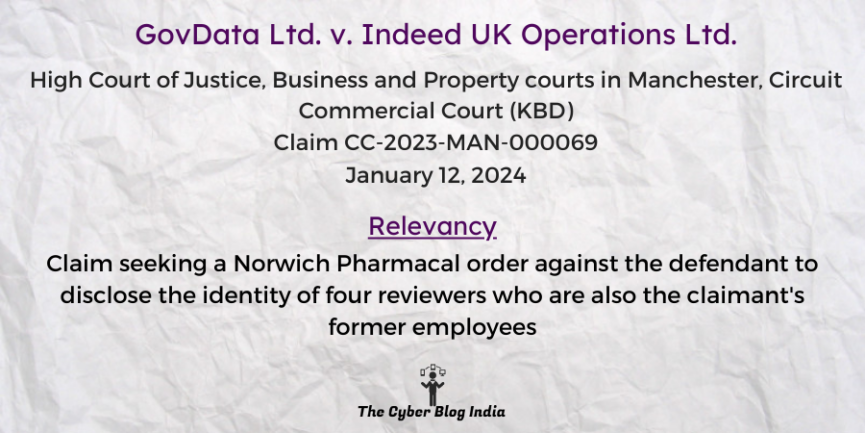Govdata Ltd. v. Indeed UK Operations Ltd.

GovData Ltd. v. Indeed UK Operations Ltd.
[2024] EWHC 39 (Comm)
In the High Court of Justice, Business and Property courts in Manchester, Circuit Commercial Court (KBD)
Claim CC-2023-MAN-000069
Before Judge Pierce
Decided on January 12, 2024
Relevancy of the case: Claim seeking a Norwich Pharmacal order against the defendant to disclose the identity of four reviewers who are also the claimant’s former employees
Statutes and Provisions Involved
- The European Convention on Human Rights 1953 (Article 8, 10)
- The Defamation Act 2013 (Section 1)
- The Limitation Act 1980 (Section 4A, 32A)
Relevant Facts of the Case
- The defendant operates a job posting company. One of the features is to post anonymous information about employers.
- Ex-employees of the claimant company posted 4 reviews on the defendant’s site. The claimant contended that these 4 reviewers were wrongdoers. They asked the defendant to furnish the personal information of the reviewers. There was no other way to identify these reviewers.
- The defendant refused the request. Hence, the claimant seeks an order from the court to the same effect. The claimant wished to file cases of defamation/malicious falsehood against the anonymous reviewers.
- These orders are known as Norwich Pharmacal orders.
Prominent Arguments by the Counsels
- The claimant’s counsel relied on the test in Swain v Hillman to determine whether the claim could succeed. The probable causes of action against the defendant are harassment, assault, breach of employment contract, breach of privacy, and economic torts. The reviews have caused mental harassment of the claimant’s employees and damaged the claimant’s reputation. The reviewers’ freedom of expression is less worthy of protection. Also, they have caused financial harm to the claimant.
- The defendant’s counsel submitted that all four reviews were time-barred. The users of the defendant’s site had a legitimate expectation of privacy. Anonymity is the very condition that enables them to post the reviews. The evidence shows that the defendant is not liable for the pecuniary damage. The source of this evidence is either Google reviews or the Employment Tribunal proceedings.
Opinion of the Bench
- The requirements to pass a Norwich Pharmacal order are summarised in Mitsui & Co Ltd v Nexen Petroleum Ltd. The court has the discretionary power to pass the order only after these requirements are met. A court should also fulfil the assessment criteria given in Davidoff v. Google.
- The order sought raises issues under Article 8 and Article 10 of the European Convention on Human Rights. As the claimant trades for profit, they must demonstrate that they have suffered from fiscal harm.
- The claim of defamation is weak, as these reviews are mere opinions. There is no evidence to show that they have caused pecuniary damage.
- The claimant has sought the order not to vindicate their rights but to shut down all criticisms against it. There is a public interest in protecting the anonymity of reviewers.
Final Decision
- The court rejected the claim.
